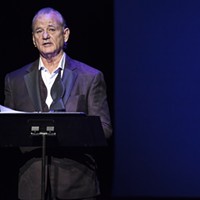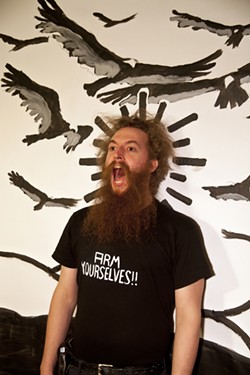Living at the Milestone is no picnic. You have to pack heat, says Andy Fenstermaker. He should know. He's worked the door at the beat-up West Charlotte punk club for the past seven years, and even lived there with former owner Neal Harper for eight months in 2006. At night, after the last band screeched to a stop, the two would stake out spots in the bar area and curl up for a little shut-eye. All was quiet in the club except for the furnace, which sputtered hot air into the moldy space surrounded by graffiti-covered walls. They'd wonder if the noises they heard outside were from a prowler or just their own paranoia. Sometimes they wouldn't see the sun for days. But Fenstermaker and Harper rested easier knowing they had pistols by their sides and bar tables to provide cover in case someone broke in.
All that was long ago. Harper's moved on, and the Milestone now has a new owner. Fenstermaker still works the door on weekends, but these days he's better known by his stage name Andy the Doorbum, one of Charlotte's rising stars of the indie-folk scene. "I'm glad I did it, but I wouldn't do it again," Fenstermaker says of living at the legendary Tuckaseegee Road dive. "When you go to sleep and keep hearing someone tugging on the door, it really wears on your nerves. It kind of drives you insane."
Today Fenstermaker channels that insanity into his music — and he sleeps soundly in the home he shares with his artist girlfriend off Central Avenue. That's where he recorded his latest album, a departure for the wild-ass 28-year-old singer/songwriter. It's a double-vinyl LP with a long, Fiona Apple-worthy title: The Man Killed the Bird, and with the Bird He Killed the Song, and with the Song, Himself. It also happens to be Fenstermaker's most somber, soft and accessible set of music to date.
Fast-forward to February 2012: Andy the Doorbum shuffles onto the Milestone stage, his disheveled hair and long, scraggly beard making him look like he just crawled out from under one of those bar tables. He sits down, wipes his hands off on his dirty jeans and plugs in an acoustic guitar. He could be a long-lost Avett brother or a member of Band of Horses gone solo -- that is, until, without warning, he punches his guitar pick downward and unleashes a pained yowl that's more Captain Beefheart than Jackson Browne or Jim James. And if the tones coming from the stage aren't startling enough, the lyrics -- "late in the night when that man's in my dreams, the one I will kill before he can kill me" -- are.
"The approach I took when I started was to hit the acoustic guitar as hard as I would hit an electric guitar if I was playing a punk-rock song, and yell with about the same intensity," Fenstermaker says. He's in his home studio, surrounded by guitars and piles of his paintings. "I always say it's acoustic, but not coffee-shop acoustic or typical singer-songwriter acoustic."
At his shows, Fenstermaker hopes people stick around long enough to pay attention to his music, but his noisy squall has cleared a few rooms. That may not be the case with The Man Killed the Bird ... It's different from his previous releases. There's almost a romantic sensibility in Fenstermaker's voice as he shares the story of a grave digger in "The Ditch." But Fenstermaker is no romantic. He offers a raspier growl on "The End," a tale of arsonists, drug users and whores. Fenstermaker doesn't do foot-tapping front-porch music. This is back-alley folk for people who prefer PBR and whiskey to wine and cheese.
"The new record is a little more toned down, but lyrically, and the ideology behind it is ..." — he trails off — "they're not love songs. They're not the typical [sensitive] subject matter, and I guess that's the punk influence. A dude who looks like me, who gets on stage with an acoustic guitar — people assume I'm going to sound a certain way. With my past releases, I feel like I've made it a point to do stuff that's in a broad enough spectrum. My records are all over the place, but that's because I'm all over the place and my musical influences are, too."
Those influences include Beefheart, Nirvana, the Pixies and Leonard Cohen, which he discovered while growing up and still listens to today, in addition to varieties of indigenous musics from around the world that he finds while scouring the internet and thrift stores. Lyrically, he finds inspiration in his travels — he's been to Europe and Central America — and through his avid reading about world and American history.
Fenstermaker grew up in Gaston County, spending summers working on family farmland in Pennsylvania. Throughout his childhood, he was surrounded by country and gospel music as one relative or another would always have a guitar handy at family gatherings.
He was around 9 when he created a band with his stuffed animals, giving each one a different voice and writing songs for them. At 14, Fenstermaker started hearing punk and underground music. That's when his dad bought him an electric guitar. "It took me all of two days with the guitar to realize, this is what I want to do," Fenstermaker says.
Growing up hearing his parents' Hank Williams, Merle Haggard and Waylon Jennings records sparked a sense of rebellion, and punk was his outlet. From 16 to 24, Fenstermaker was in a band called IYF Pork. The band wrote 100 or so punk songs, but never formally recorded anything.
It was during this period that Fenstermaker would drive to Charlotte regularly to see concerts and to try and get his band some gigs. He was working three jobs, including stints at Bi-Lo and Subway, so he could save money to buy a car and gas. A chance meeting with future Milestone owner Harper at a Queen City Underground concert eventually led to friendship. When Harper took over the punk club, Fenstermaker constantly pestered him about a job — any kind of job.
"He kept bothering me about getting a job there and I kept saying, 'You're bothering me, kid. I don't need help,'" Harper says. "I finally said, 'You think you're bad enough to run the door? Go do it.'"
Fenstermaker wound up spending a lot of time in the door booth at the Milestone, and though no one can recall exactly who gave him the nickname, people were always calling him Andy "the doorbum." While hanging out in the club after hours with Harper and fellow musician Robert Childers — the drummer son of critically acclaimed Mt. Holly singer/songwriter David Childers — Fenstermaker's friends pushed him to do some acoustic guitar songs.
"Robert and Neal and I would sit around at the end of the night, hang out, get drunk and play guitar. They convinced me to do some solo shows," Fenstermaker says. "I was terrified of it — it was weird after playing with a bunch of noise behind me."
"Andy always saw himself as the frontman for a punk-rock band," Harper says. "The songwriting, though, was always really strong. It came out of asking him to play his punk songs on an acoustic."
Originally calling himself Ugly Dobro alongside Childers' Handsome Banjo, Fenstermaker eventually took on Andy the Doorbum as a monicker for his music as well as his visual art and other projects. But he still thinks of himself in Ugly Dobro terms.
"My family is real rural farming folk — I think that's impacted me in every way it could have," he says. "I'm a simple-living sort of guy. My ethos and outlook on life are a lot closer to someone who lives on a farm than someone who plays punk and lives in the city."
The Man Killed the Bird... — the title is from a pygmy legend — is the fourth Andy the Doorbum album. His other releases include a cassette tape, an EP and a few 7-inch records. He's recorded most his music from the comfort of his home studio, but he cut his first album in that small, cramped door booth at the Milestone. Where else?
Harper had bought a new PA system for the club and asked the sellers to throw in a four-track recorder. He gave it to Fenstermaker. "I told him it was part of his payment for working the door, and that he should record an album while he was in there," Harper says. He helped Fenstermaker set up a microphone and cymbals in the door booth, and — voila! — Fenstermaker's debut, The Doorbooth Album, was born.
Spending seven nights a week at the Milestone, either working or playing shows, Fenstermaker found it tough to make the long drive back to Gaston County each night, so he moved into the club with Harper, who'd been living there for a couple of years. Tuckaseegee Road is in a rough neighborhood, so the two developed safety strategies, like a routine they called "clear the place," which entailed going around the building with their pistols to make sure no one else was inside when they slept.
"Neal liked having me there because then he knew he wasn't the only one hearing things," Fenstermaker says. "Eventually, I moved into the attic. There's still a cage area up there where I used to keep my two cats."
The club has no kitchen. No shower. No hot water. "We would take sink baths in the dirty-ass Milestone bathrooms," says Fenstermaker. "After a point, we realized we weren't getting clean because any cleanliness was gone within minutes just from being in there. Without windows, you can't tell what time of day it is. There'd be times when you'd stay up all night bullshitting with the bands and go to bed at 10 a.m. and wake up at 7 p.m. when the next bands were coming to load in."
Shortly after Fenstermaker moved in, Harper started staying with a girlfriend. Not long after that, he got his own place and Fenstermaker followed, eventually moving out of the Milestone and becoming Harper's roommate.
"In a lot of ways, I became a man while working at the Milestone," says Fenstermaker. "I wasn't even 21 when I started working there. I was a kid."
Fenstermaker has explored all sides of his musical personality as Andy the Doorbum. He's experimented with layering to develop complex sounds, and stripped things back to offer a more somber, sparse tone. His creativity, he says, comes from not watching television.
"I've been TV-free for about seven years," he says. "That was on purpose. Television is a huge distraction. Without one, if I'm bored, I'm more inclined to work on music. That screen doesn't offer anything fulfilling."
He also spends time scouring thrift stores for records that find their way on to his Plaza Midwood Community Radio show, "The Weird World of Traditionally Unconventional Music." Fenstermaker's home contains a handful of boxes of vinyl full of some odds and ends that he's picked up in addition to albums he's kept from his childhood years — Butthole Surfers, Creedance Clearwater Revival, among them.
For his Andy the Doorbum gigs, Fenstermaker either plays solo or with multi-instrumenalist Buck Boswell on banjo, drummer Ricky Culp, or both. He has played electric sets three times with the band, but usually performs acoustic. He's come a long way from his punk days, in part due to Harper's insistence. "I pushed Andy to play because I liked what he did and thought other people might like it, too," Harper says. "I kind of took Andy under my wing like a little brother and still, to this day, if he needs advice or anything, he's always welcome to call and I'll help him with anything I can."
Fenstermaker, sitting in his home studio flanked by two racks of acoustic and electric guitars, says he doesn't have strong ties to any of his instruments. He usually plays two of the acoustics because they sound the best. There's also an aged Fender he says he'll never play.
"It's my mom's wedding present to my dad," he says. "He took it to every party he went to and played old country songs. He was hard up for money and I bought it from him with the condition that he couldn't ever buy it back from me. I knew it was really sentimental. If he was gonna part with it, he had to commit to it. It's the only one that really means something to me. I'm sure he was going to give it to me one day anyway."
His latest album is a dream come true for Fenstermaker, who says he always wanted to release a vinyl record. The medium, with its "cracks and pops," offers the perfect accompaniment to his sound. He says if it weren't for cost, he would have released all of his albums this way.
"I think every album he's done has been different, but I think this new one is his best work so far," says Harper, who helped him mix the entire set in just three days. "I think it matches his persona much more than any of the others."
When Fenstermaker's not playing music, he still works nights at Snug Harbor and the Milestone.
"Even if I didn't work the door anymore, I'm always going to be Andy the Doorbum," he says. "I've made a name for myself that way. I do visual art, I'd like to publish a book of short stories, and I'm doing a radio show — all of that is Andy the Doorbum." Not that he set out to cultivate an image. "I didn't approach it as marketing or branding," he says, "but that's what it is."
ANDY THE DOORBUM
With Temperance League, JKutchma, Bobby Childers. $5. Feb. 18. 10 p.m. Snug Harbor.
Speaking of...
Latest in Music Features
More by Jeff Hahne
-

Chvrches ups the energy
Oct 17, 2018 -

Florence & The Machine offer a vocal showcase in Charlotte area
Oct 4, 2018 -

Bill Murray, Jan Vogler and Friends entertain with wit, classic arts
Oct 2, 2018 - More »
Calendar
-
Hozier - Unreal Unearth Tour 2024 @ PNC Music Pavilion
-
Beach Fossils with friends Nation of Language @ The Underground
-
The Rock Orchestra By Candlelight @ N.C. Music Factory
-

Haw River Wine Tasting @ Carolina Beer Temple.
-
ATTILA, BORN OF OSIRIS w/ TRAITORS, EXTORTIONIST, NOT ENOUGH SPACE @ The Underground
-
Justin Fedor's tribute shows benefit Levine Children's Hospital
Charlotte musician's concert series takes place at the Neighborhood Theatre
-
Live review, photos: Chickenfoot 4
-
Christian punks MxPx wrestle with doubt — and greatness 30
Mike Herrera lets his band grow beyond its beginnings

















